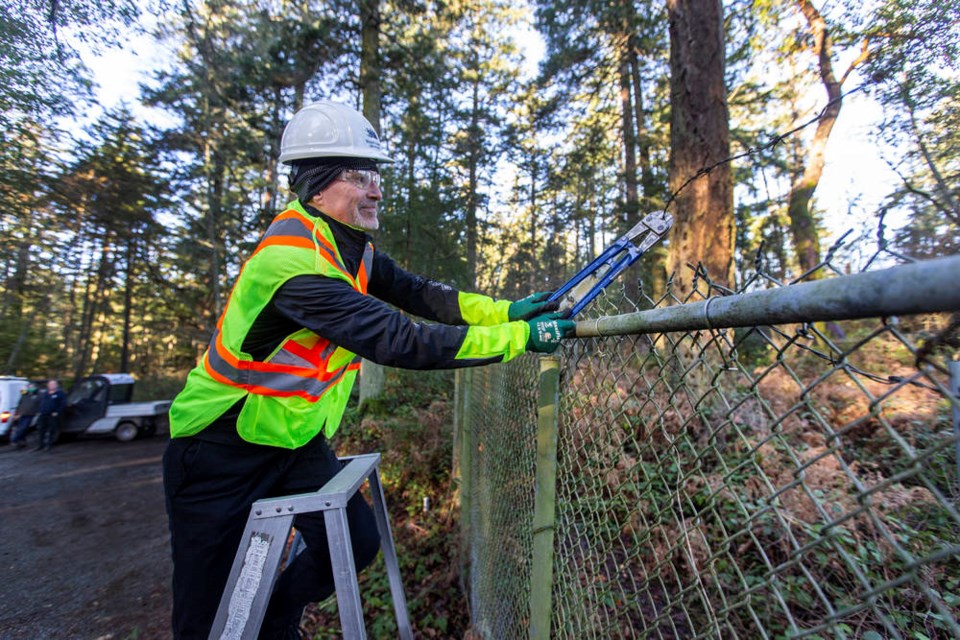Philip Steenkamp snipped a section of barbed wire at Royal Roads University on Wednesday in a symbolic gesture to mark a new era of public openness.
By next week, the kilometres of Cold War-era barbed wire that topped the fencing around the 565-acre former military academy and firing range will be gone, and new sections of the property will be open for wider use, such as public gardens.
“It’s a message to our neighbours, to the West Shore and to people in general that we are not a penitentiary … we are a place of learning,” said Steenkamp, the university’s president. “Barbed wire sends the wrong message.”
Royal Roads is on the site of Hatley Castle, a National Historic Site with a long and colourful past, dating to the late 1800s, when it was built by the coal-baron Dunsmuir family. It was sold to the federal government in 1940 as a possible refuge for the royal family, who had picnicked there in 1939, or the king who had abdicated, but the main use was churning out officers for the Second World War.
Royal Roads Military College trained young air force, navy and army cadets until 1995, including Canada’s most famous astronaut, Chris Hadfield.
RRU opened in 1995 and still leases the waterfront property of gardens, forest trails, streams and a collection of buildings from Ottawa for $1 a year on a 50-year agreement. The school is also responsible for maintaining the lands.
Last year, on its 25th anniversary, the university set out a new strategic vision: “Inspiring people with the courage to transform the world.”
“One of those goals is to invite the people in, and for the university to venture out,” said Steenkamp, adding many people regard the campus as the “Stanley Park” of the West Shore. “I see hundreds of people a day walking their dogs, enjoying the gardens, runners … even today, as I was cutting the barbed wire, a group of small children and their teacher were passing by. This is what we want to see here at Royal Roads — people of all ages using the property.”
Steenkamp eliminated admission fees for accessing its extensive gardens last year, and said large plots will be opening this year for community gardens. The walled garden and greenhouses will be converted to grow vegetables for food services on campus and for local food banks.
He envisions the military academy’s abandoned tennis courts being turned into raised beds for community gardens. The university recently established beehives there to supply honey for use in its food services.
“The whole future is about food production and security,” said Steenkamp. “Growing food closer to home is a major concern, especially in light of the pandemic, and [RRU] needs to be part of the answer.”
The former swimming pool and squash courts left by the military have been redesigned into a large auditorium with a capacity of about 400. The Dogwood Auditorium will open next month and be used as classrooms during COVID, but also as community space for the West Shore.
Steenkamp said the Sooke Philharmonic Orchestra has expressed an interest in using the auditorium as its home base.
There is also a campaign underway to rename buildings to reflect Indigenous culture.
The famed Japanese Garden is undergoing a masterplan redesign, and its main feature, the water wheel, is restored and working again.
Off campus, RRU is teaming with Camosun College and the University of Victoria to open a “lifelong learning centre” in Langford. The schools are exploring either a lease or new build for the centre, which would allow people “to up-skill or re-skill and offer micro-credentials to get back into the workplace,” said Steenkamp.
He said cutting the barbed wire sets a lot in motion.
“We have this spectacular gift of land and we want to bring people in to feel part of it,” he said. “At the same time, we want to be out in the community providing learning.”
As for the barbed wire, it will be recycled. A small section will be kept for the museum in the basement of Hatley Castle.



